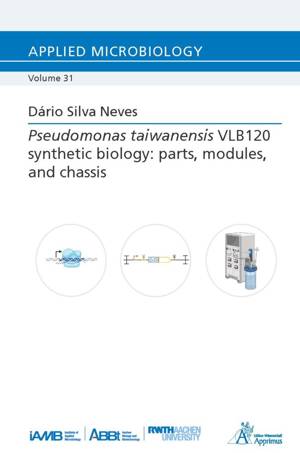
- Retrait gratuit dans votre magasin Club
- 7.000.000 titres dans notre catalogue
- Payer en toute sécurité
- Toujours un magasin près de chez vous
- Retrait gratuit dans votre magasin Club
- 7.000.0000 titres dans notre catalogue
- Payer en toute sécurité
- Toujours un magasin près de chez vous
48,45 €
+ 96 points
Description
Climate change is a pressing global issue that is caused by the consumption of fossil fuels, which releases greenhouse gases into the atmosphere. Cell factories are biological systems that are engineered to produce a wide range of products, such as biofuels, bioplastics, and pharmaceuticals which can play a crucial part in reducing the dependency on fossil fuels. Additionally, cell factories can be made more efficient and sustainable by using advanced technologies such as metabolic engineering and synthetic biology. This thesis aimed to expand the genetic toolbox of Pseudomonas taiwanensis VLB120 and implement them for the generation of a chassis strain to enlarge the product portfolio of this emerging industrial-relevant cell factory. Sigma-70 dependent promoter libraries were generated and integrated into the single genomic locus attTn7 of P. taiwanensis VLB120 and E. coli TOP10 and characterized using a standardized promoter strength unit. Such characterization standards gave an insight into how a specific promoter behaves in each organism and create sets of promoters relevant to metabolic engineering purposes. This thesis also focused on the assessment of an optimized gene expression architecture to achieve high gene expression. This module achieved high gene expression across several expression vectors of two fluorescent reporter genes by incorporating mRNA stabilizing and translation-enhancing genetic parts. This module was also applied to increase the productivities of a short acetoin pathway and the relevance of mRNA stability was proven through qPCR-based mRNA decay rates. These tools were a component in the development of a P. taiwanensis VLB120 propionyl-CoA chassis strain to expand the portfolio of this pseudomonad to odd-chain products. The successful incorporation of propionyl-CoA in the metabolism of P. taiwanensis VLB120 was confirmed by the production of propionate after identifying the deletion of the methylcitrate synthase as a crucial factor. In summary, this thesis contributes to the development of P. taiwanensis VLB120 as an emerging industrial-relevant workhouse by expanding the available genetic toolbox and setting the first stone to produce odd-chain products in this organism. It also contributes to the standardization of genetic tools characterization and cross-species studies to aid the identification of the most suitable microbe for specific biotechnological applications and fasten the human independence of fossil fuels.
Spécifications
Parties prenantes
- Auteur(s) :
- Editeur:
Contenu
- Nombre de pages :
- 124
- Langue:
- Anglais
- Collection :
- Tome:
- n° 31
Caractéristiques
- EAN:
- 9783985551705
- Format:
- Livre broché
- Dimensions :
- 148 mm x 7 mm
- Poids :
- 243 g

Les avis
Nous publions uniquement les avis qui respectent les conditions requises. Consultez nos conditions pour les avis.






